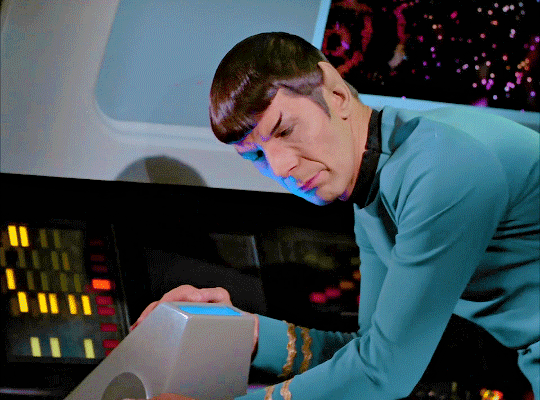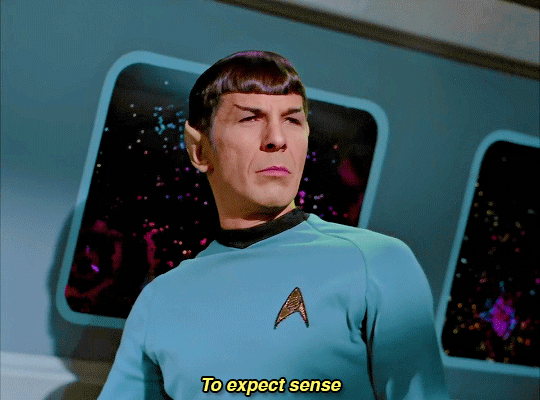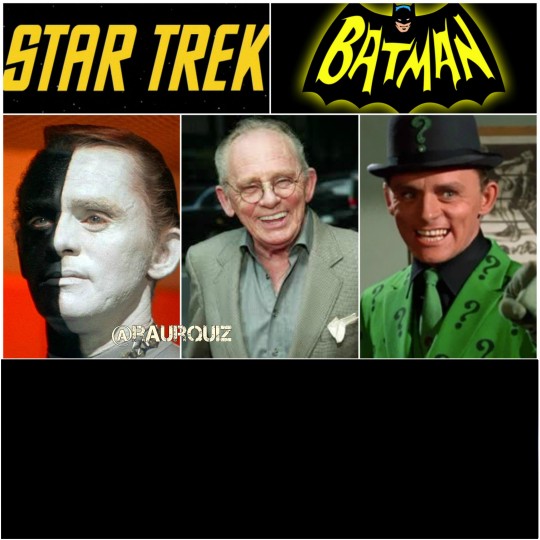#let that be your last battlefield
Explore tagged Tumblr posts
Text
I'm just gonna sit down and stare into space for a while after star trek season 3 episode 15 "let that be your last battlefield" (1969)























#also that's the riddler#star trek#star trek tos#james t kirk#jim kirk#spock#s'chn t'gai spock#nyota uhura#pavel chekov#hikaru sulu#let that be your last battlefield#long post
92 notes
·
View notes
Text
I'll take bad episodes (poor acting/bad sets) over episodes that are abjectly awful takes ala 'let that be your last battlefield' equivocating the oppressed and the oppressors is a wild take even for the 60s
44 notes
·
View notes
Text
hello HI yes for the love of god hello. where is my lower decks episode homage to the original series' "Let That Be Your Last Battlefield" except cetacean ops is on the scene to help mediate between these two aliens:


#lower decks#star trek#the original series#tos#star trek tos#let that be your last battlefield#cetacean ops#posts I created
32 notes
·
View notes
Text




3x15 - Let That Be Your Last Battlefield
#listen to spock before you log on to twitter#star trek#star trek tos#spock#let that be your last battlefield#tosrw*#originalposts*
559 notes
·
View notes
Text


Original and remastered decontamination shots. Spot the open hatch in the latter.
(Original version screen shots from www.trekmovie.com)
14 notes
·
View notes
Text
Let That Be Your Last Battlefield: The Enterprise encounters two duo-chromatic and mutually belligerent aliens who put the ship in the middle of their old conflict.
The Way to Eden: A group of idealistic hippies, led by an irrational leader, come aboard the U.S.S. Enterprise.
Feel free to reblog in order to help this poll reach the most people! Remember to vote on the other polls in this round, listed here!
#star trek#star trek tos#james kirk#bones mccoy#spock#Star Trek bracket#elimination game#star trek poll#let that be your last battlefield#the way to eden#racist aliens#vs#space hippies#jim kirk#leonard mccoy
24 notes
·
View notes
Text
21 notes
·
View notes
Text



Slugs vs snails, in space ✨🐌🫠✨
#let that be your last battlefield#slugtrek#star trek tos#star trek#star trek fanart#star trek comics#spirk#silly little guys
33 notes
·
View notes
Text
I keep seeing people point to the STAR TREK: TOS episode "Let That Be Your Last Battlefield" as an example of STAR TREK's progressive bona fides, which really gets up my nose because "Battlefield" is, along with "A Private Little War," "The Omega Glory," "The Paradise Syndrome," and a couple of others, among the half-dozen or so most politically unsavory TOS episodes, a statement of unvarnished white liberal contempt toward the civil rights movement.
First, like a lot of TREK, and like the superhero comic book stabs at "relevancy" in this period and afterward, the episode is, at a structural level, constructed to let the white middle-class liberal hero sit in judgment on contemporary social issues that only incidentally affect him, but which he is privileged to weigh from a position of presumptive neutrality. This is a common feature of the series, but it becomes especially pointed here because when this episode aired in January 1969, no viewer over the age of about 6 would be likely to miss what it was talking about; the episode originally aired just a little over nine months after the assassination of Martin Luther King Jr.
It is noteworthy, then, that the script goes to particular lengths to distance Kirk and the other Enterprise regulars from the racial conflict between the black-and-white aliens Lokai (Lou Antonio) and Bele (Frank Gorshin). Spock goes so far as to insist that they are wholly outside known standards of "genetically possible" "gradiations of color" in humanoid beings! At no point does any of the crew express any sympathy or identification with Lokai; Chekov and Sulu regard racial persecution as an historical curiosity with which they have no experience, and even Spock, who experiences racial persecution on the regular, dismisses both Bele and Lokai as hopelessly irrational.
This is curious insofar as Lokai clearly describes conditions of material oppression that any Black person in America would immediately recognize: He says Bele's people "raided our homes, tore us from our families, herded us together like cattle, and then sold us as slaves," and that after slavery ended on their world, Lokai's people continued to be second-class citizens, "denied the simpest bit of decency that is a living being's right." They were even drafted into "a war on another planet," a clear reference to the then ongoing Vietnam War; this was the era when Muhammad Ali nearly went to prison for refusing conscription. Notably, Bele doesn't deny most of this except to chide Lokai's framing of it, telling Kirk, "They were savages, Captain. We took them into our hearts, our homes. We educated them."
Nonetheless, Kirk's primary reaction to both Lokai and Bele is annoyance. Kirk is not concerned with justice, or addressing historical injustice; his sole concern is the maintenance of Federation civil order. As is often the case on TOS, this is framed in economic terms: The Enterprise is supposed to be heading to a medical decontamination mission on the planet Ariannus, whose urgency is underscored by its importance "as a transfer point on regular commercial space lanes." (Kirk notes that the bacterial contamination he's supposed to address may "render it lifeless unless checked," but he presents that as an afterthought to the commercial urgency of the situation.) Kirk is also concerned with Lokai's appropriation of a Starfleet shuttlecraft, which appears to completely undermine any sympathy he might have otherwise had for Lokai. This also seems to be the position of Kirk's superiors; Uhura reports that Starfleet is entirely sympathetic to Bele and is likely to grant his request "after a hearing at Starbase," once the legal formalities have been observed. (Significantly, the possibility that Lokai might have a claim to political asylum, even temporarily, is never suggested.)
Kirk is SO preoccupied with maintaining economic, civil, and legal order that he's prepared to destroy the Enterprise himself rather than concede any ground even rhetorically. There is an apparently unintended parallel here with the revelation at the end of the episode that Cheron is now lifeless, its entire population wiped out by the racial conflict of which Lokai and Bele are the sole survivors, but the episode pretty obviously expects the viewer to find Kirk's position sensible and principled.
The episode's obvious thesis is that Black Power and Black protest are just as bad as the bigotry Bele represents, a kind of racial horseshoe theory underscored by Spock's eventual declaration, "To expect sense from two mentalities of such extreme viewpoints is not logical." Presumably, the "correct" course for Lokai's people would have been to accept their second-class roles in post-slavery Cheron society, work toward the furthering of economic order, and patiently wait for the "normal" forces of social evolution to bring about justice through legal means, and the episode unequivocally indicates that their failure to do so bears equal responsiblity for the apocalyptic genocide Spock says has taken place on Cheron. (There's an ugly parallel here with the racial politics implicit in the 1968 film PLANET OF THE APES, which kicks off what is at its core a very racist series.)
Throughout the episode, the script tries to play up the irrationality of Lokai and Bele by emphasizing that their conflict has taken place over thousands of years, but because we don't have any idea what their normal lifespan may be (there's no indication that their survival over the course of 50,000 years is due to suspended animation or time travel), or even how long they consider a year, this carries little weight, and it can't overcome the obvious familiarity of the conflict. In the real world, the American Civil War had only passed out of living memory about two decades before this episode was written, and until the passage of the Civil Rights Act less than four years earlier, it was still perfectly legal in many parts of the U.S. to refuse to hire, rent to, or sell to people of color, or to pay them less or charge them more based on race.
That Kirk's crew considers this ancient history is not the problem with the story; the problem is that the episode takes the obvious position that Black Americans should just get over still recent — and still ongoing, now as well as then — injustice and persecution. That's not a progressive viewpoint — it smugly exemplifies what Martin Luther King had called "allies more devoted to order than to justice." I imagine it was infuriating then except to the most self-congratulatory white liberal viewers, and it has not aged well at all.
#teevee#star trek#star trek tos#let that be your last battlefield#lou antonio#frank gorshin#racism#antiblackness
20 notes
·
View notes
Text

Star Trek (1966), "Let That Be Your Last Battlefield" poster by Tom Whalen, 2011
#tom whalen#star trek#let that be your last battlefield#poster#poster art#art#illustration#2011#2010s
49 notes
·
View notes
Text

...Ranboo?
#mcyt#star trek tos#star trek#ranboo#let that be your last battlefield#Ranboo face reveal!!! 😱😱😱#60 years early#ranboo mcyt
14 notes
·
View notes
Text

#star trek#politics#saffi#jadzia/lenara#benjamin sisko#michael burnham#kirk/uhura#let that be your last battlefield#the killing game#the measure of a man#tuvix#i think i tagged most of them idk#star trek: tos#star trek: picard#ds9#voyager#tos
48 notes
·
View notes
Text
kirk was so fucking crazy to threaten to the blow up the enterprise to kingdom come just bc those oreo aliens had control over it for two seconds I just know he was on his period
12 notes
·
View notes
Text

i know the hate sex goes crazy
#was i the only one who wanted to see them kiss#star trek#star trek tos#let that be your last battlefield#lokai#bele#lokai and bele#puppyfail
5 notes
·
View notes
Text








One of the better scenes in the story, even if the code is daft.
Kirk- "Destruct sequence one, code one, one-A."
Spock- "Destruct sequence number two, code one, one-A, two-B."
Scotty- "Destruct sequence number three, code one-B, two-B, three."
K- "Begin thirty second countdown. Code zero-zero-zero-destruct-zero."
Chekov- *parp*
10 notes
·
View notes
Text

#remembering #FrankGorshin #actor #bele #startrek #LetThatBeYourLastBattlefield #batman #TheRiddler #murdershewrote #buckrogersinthe25thcentury #ballsareriding #invasionofthesaucermen #charliesangels #hawaiifive0 #12monkeys #HailCaesar #BlackScorpion #Threshold #startrek57
#remembering#frank gorshin#actor#bele#startrek#let that be your last battlefield#batman#the riddler#murder she wrote#buck rogers in the 25th century#ballsareriding#invasion of the saucer men#charlies angels#hawaii five 0#12 monkeys#hail caesar#blackscorpion#threshold
6 notes
·
View notes